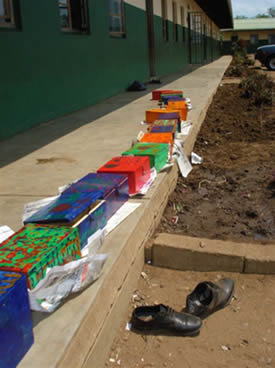048-137-NPO
PBO no. 930018601
Write to:
Zisize Educational Trust
PO Box 232 Ingwavuma
3968
KwaZulu Natal
Telephone:
035 5725500
Assessment, Skills for Life & Therapeutic Interventions
The Abaqophi BasOkhayeni Abaqinile Children’s Radio Project |
|
Zisize’s Children’s Radio Project began in 2005 and is a collaboration between Zisize, The Children’s Institute at University of Cape Town, Okhayeni Primary School and, more recently, The Radio Workshop. It involves 30 children who, through a careful child participatory process, make radio programmes about issues they are interested in and which affect their lives. They have also been fortunate enough to have had the opportunity to interview several famous people including American actor Samuel L Jackson when he came to Ingwavuma with other supporters of ANSA (Artists for a New South Africa).www.ansafrica.org
|
|
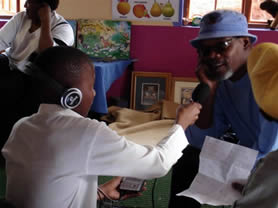 |
|
| The 26 radio diaries and 6 documentary programmes produced to date - in isiZulu - by the Abaqophi basOkhayeni Abaqinile (“the Strong Recorders from Okhayeni”) are special in that children’s own voices are heard and their own concerns and interests expressed. They are also directly relevant to inform the responses of parents, communities, civil society and government to children in the context of widespread poverty and HIV/AIDS. Their confidence has grown markedly. | |
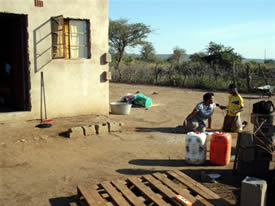 |
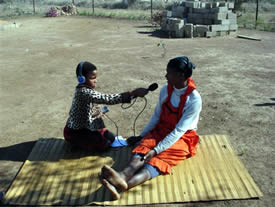 |
| These programmes are mainly aired on Maputaland Community Radio, the closest local community radio station (70kms away). They are taught recording and editing skills by Zisize's Radio Team | |
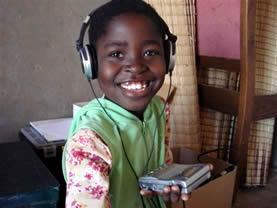 |
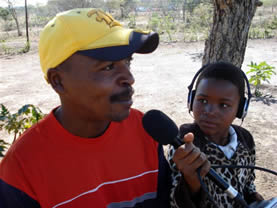 |
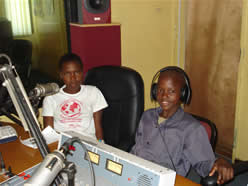 |
|
Listen to programmes (with transcripts) through the following link: |
|
Memory Box Programme |
|
Zisize’s Memory Box Programme involves work with children who have lost one or both parents or someone they loved and were close to. It takes them through a process of being able to talk about their loss and to grieve if necessary. Many children have never been afforded the chance to grieve as, for many in rural South Africa, they are frequently excluded from the grieving process which adults go through before a funeral. Many are not told about a death until just before the funeral takes place – as a way of protecting them from the pain of knowing. It is also customary not to talk about the person who has died for many months – and sometime even years - after the funeral. The desperate pain of silent grieving has a detrimental effect on children in many ways. In the therapeutic Memory Box process children create a box in which to keep their memories or memorabilia of the person who has died, as well as their own book. |
|
|
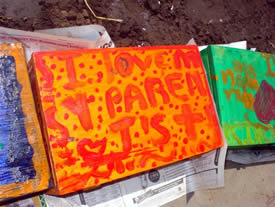 |
| It is tragic that most of these children have nothing tangible of their deceased loved ones to put in their boxes, no photos, items of clothing, or jewelry, so their memories often take the form of drawings, paintings and the written word. A child who recently participated in the Memory Box Programme commented: "I no longer feel afraid to talk about my dead parents. When I speak about them now it’s as if the pain has gone and I feel happier inside". For more information on Memory Boxes visit www.repssi.org |
|
Foster Care |
|
Loss of parents is difficult for any child, but is compounded by increased poverty in most cases. When taken in by extended family, there is no immediate financial aid. This is dependent on having the correct certificates in order to apply for a Foster Care Grant. Many do not have these and so have no recourse to public funds. Those who do have certificates were often waiting years for a social work assessment. Zisize now has its own Social Worker who is able to expedite matters and to assist with obtaining the necessary certificates or affadavits. As an addition to Ekukanyeni which has taken in orphans and abused/abandoned children, Zisize's Social Worker is recruiting and training foster carers to look after children with no surviving relatives able to care for them.
|
|
Interventions by Psychologist |
|
Thanduxolo Mngomezulu is the only psychologist in the area. He came to Zisize as an intern but is now fully qualified. He began by testing children who had been failing at school or presenting difficulties which teachers did not now how to manage. More than 100 children have been identified as having a Learning Disability which entitles them to a Disability Grant and to specialised education. He also conducts workshops on mental health, parenting skills, substance abuse, and informal assessment of a child by an educator. He and Thokozani, Zisize's social worker conduct counselling for those children who have been abused and/or bereaved. |
|
Skills for Life |
|
The Zisize lifeskills team runs weekly clubs at each of the six Zisize schools and both Centres. The clubs are made up of 20 children each between the ages of 9-14 where child-participatory activities are facilitated. The objectives of the lifeskills clubs are to:
The children are currently busy with making Hero Books – where they become the author and illustrator of their own life story and in the process identify circles of support in their lives, find ways to recognise and name their difficulties and find tactics to cope with these difficulties. For more information on the Hero Book process, visit www.repssi.org |
|
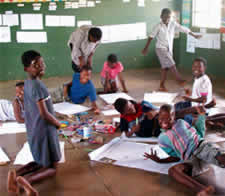 |
 |
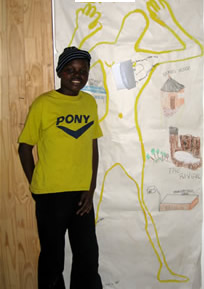 |
Above, children are making Hero Books. They are encouraged to recognise themselves as the heroes they are.
Left shows a child with her Body Map which shows painful experiences and those people, places, activities which give them positive experiences and strength. |
Forum Theatre Project |
|
Forum theatre is widely used in the developing world to empower communities and debate issues. The audience watches a play unfold where the main character makes various choices, often leading to unfavorable consequences. A facilitator then leads a discussion with the audience, the play is performed again, and audience members are encouraged to stop the action, replace the main character and attempt a different choice resulting in an alternative outcome. This method allows the audience to explore various possibilities or aspects of an issue thereby turning the stage into a forum for discussion through action. Zisize and its drama team have been fortunate to have the input from Jenny and Steve from 'Aiding Dramatic Change' - a Canadian charity set up to support Zisize's work. |
|
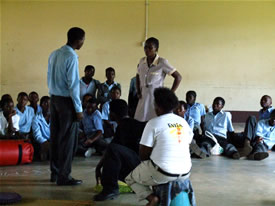 |
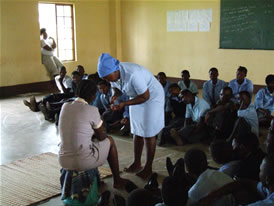 |
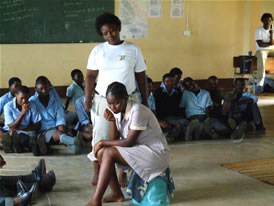 |
|
Currently 7 drama/life-skills facilitators (who receive a volunteer stipend) visit local elementary and high schools linked to Zisize Educational Trust. Their first visit involves a three day IMAGE THEATRE workshop focusing on oppression, peer pressure, gender roles and stereotypes. They then return to the same group of learners and facilitate a two day FORUM THEATRE workshop regarding community pressures and sexual relationships. During the second workshop two forum plays focussing on love and protection are performed; the adolescents have an opportunity to participate and offer alternative strategies for coping with the situations presented. Funds are needed to provide them with a salary. |
|
 |
 |
|
|
Once contact is made with the students, the facilitators continue weekly visits to the schools through the year to further unpack and debate the issues raised. Due to financial reasons, only the three closest Zisize schools participate in the weekly follow up program. Increased funds would see weekly follow-up sessions extended to more distant schools. Image theatre workshops include a parents' event at each school. During this event, the workshops are discussed with the parents to allow them the opportunity to question and be informed about what their children will be learning. It also includes a forum performance where the main character in the play is a guardian trying to protect a loved one from making dangerous choices. It highlights pressures within the community which often dictate the way adults feel they need to address issues. It also explores how parents should talk to their children about sexual relationships and peer pressures. This is the first step into bringing drama into the community as a way to address current issues. The feedback from the audience interventions also help the actors develop the play, keeping it vibrant and more relevant to the community issues. The first parents' meetings were extremely successful. They requested more opportunities to discuss issues as a community and for support in discussing these issues with youth. Future plans would see more parent meetings on a regular basis. We hope that through these discussions the ideas and thoughts that are raised would disseminate through to the wider community in addition to providing a resource for the drama group regarding pressing community issues. |
|
